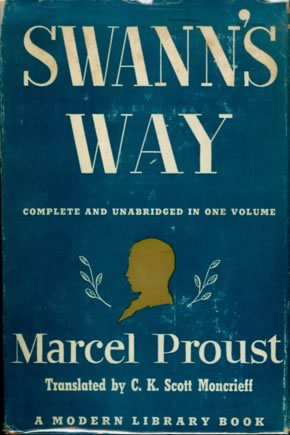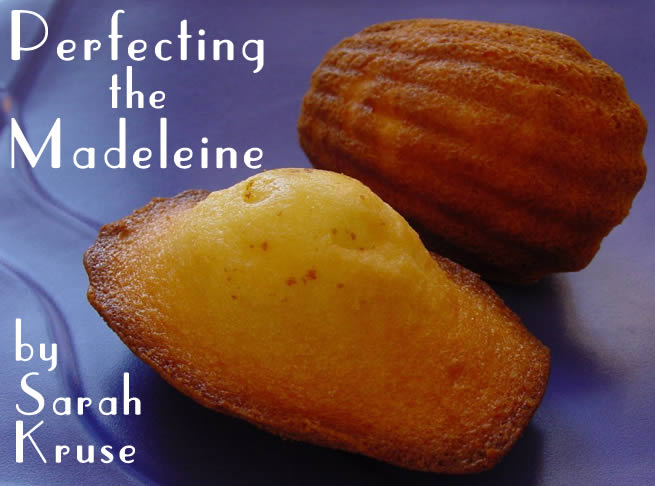 first remember reading Proust in a tea shop on the corner of 11th and Everett in Portland, Oregon. I remember sitting in the window with a plate of spice cookies and tea steeping in a glass teapot, and falling into each sentence the way you fall into a daydream on a train. It was sometime in October and it was raining. Periodically, a streetcar would whir by. Sentence by sentence, the narrator’s longing to kiss his mother goodnight unfolded without any real sense of plot; the urgency of the text lay in the exquisite, ornate sentences. As a somewhat directionless undergraduate, lingering in time without clear purpose was familiar to me.
first remember reading Proust in a tea shop on the corner of 11th and Everett in Portland, Oregon. I remember sitting in the window with a plate of spice cookies and tea steeping in a glass teapot, and falling into each sentence the way you fall into a daydream on a train. It was sometime in October and it was raining. Periodically, a streetcar would whir by. Sentence by sentence, the narrator’s longing to kiss his mother goodnight unfolded without any real sense of plot; the urgency of the text lay in the exquisite, ornate sentences. As a somewhat directionless undergraduate, lingering in time without clear purpose was familiar to me.
The famous “madeleine moment” in Proust doesn’t appear until roughly (depending upon which edition you’re reading) page sixty of Swann’s Way. Proust writes:
I raised to my lips a spoonful of the tea in which I had soaked a morsel of the cake. No sooner had the warm liquid mixed with the crumbs touched my palate than a shiver ran through me and I stopped, intent upon the extraordinary thing that was happening to me. An exquisite pleasure had invaded my senses, something isolated, detached, with no suggestion of its origin. And at once the vicissitudes of life had become indifferent to me, its disasters innocuous, its brevity illusory—this new sensation having had the effect which love has, of filling me with a precious essence; or rather this essence was not in me, it was me...Undoubtedly what is thus palpitating in the depths of my being must be the image, the visual memory which, being linked to that taste, is trying to follow it into my conscious mind.
Something captivated me. The idea of memory in a moment triggered involuntarily seemed familiar—something I’d long known but hadn’t yet been able to express. At that point in time I’d never even had a madeleine, and I became obsessed with recreating that Proustian moment, at least in taste. Something so magical and pure—could it really be constructed through a cookie and a cup of tea?
 I have always become mildly obsessed with food in books and films. As an undergraduate in a Dickens class, I spent all winter break looking for a pudding mould. Finally finding one, I spent a whole afternoon steaming up my parents’ kitchen, since steaming a proper English pudding takes eight hours. While you do get to set it on fire with brandy before serving, the end result was something similar to American fruitcake. Though not as dry as fruitcake and lacking garishly colored candied fruit, plum pudding was somehow less Dickensianly-magical than I had imagined. After seeing Wong Kar Wai’s In the Mood for Love, I scoured every Asian market in Portland for cellophane noodles, lotus root, and sticky rice. But nothing I made ever really resembled anything in the film. And I only found one restaurant in Portland that actually served congee.
I have always become mildly obsessed with food in books and films. As an undergraduate in a Dickens class, I spent all winter break looking for a pudding mould. Finally finding one, I spent a whole afternoon steaming up my parents’ kitchen, since steaming a proper English pudding takes eight hours. While you do get to set it on fire with brandy before serving, the end result was something similar to American fruitcake. Though not as dry as fruitcake and lacking garishly colored candied fruit, plum pudding was somehow less Dickensianly-magical than I had imagined. After seeing Wong Kar Wai’s In the Mood for Love, I scoured every Asian market in Portland for cellophane noodles, lotus root, and sticky rice. But nothing I made ever really resembled anything in the film. And I only found one restaurant in Portland that actually served congee.
Perfecting the madeleine, I discovered, meant not following any recipe. Through trial and error and pounds of unsalted butter (salted butter makes the batter too sticky), I discovered most recipes have too many eggs (also making the batter too sticky). Store-bought madeleines taste like chemicals and are too dense—most likely so they will ship better—making them more like pound cake than a madeleine. Five years later, in Paris, I discovered my version of the madeleine was actually very close to the French, which is far lighter in texture than those hermetically sealed ones you find at Starbucks that claim to be petite madeleines. On being asked, “Avez-vous quelque chose à declarer?” when I was returning through customs, I answered, “Le pain et les madeleines.” The French customs officer smiled, and suggested eating them on the plane with un café. But I didn’t eat them on the plane. I kept them closed in their cellophane bag with gold twist tie until I got home and could brew a pot of tea. But the tea wasn’t lime blossom tea, which I also discovered is as hard to come by as real madeleines. Sitting in my empty dinning room and listening to the rain somehow did not have the Proustian magic I wanted it to.
I have, of course, never been successful at recreating these scenes from literature. What makes them magical is context and what the text itself amplifies, but I nevertheless find myself wanting to recreate something I can only imagine, tasting what the characters might have tasted. Plus, it gives me something to do; it’s a project. Even though I realize the desire to attain something that is completely unattainable, because it’s fiction, is the pleasure itself.
 met the professor who was to become my Proust professor in a coffee shop. He was grading, I was reading, and he asked to borrow a pencil. I had registered for his class in the spring and asked what we would be reading. “Proust,” he replied. It was only much later—after that class—that he confessed to me that it was at that moment that he decided the class would be solely devoted to Proust. Alain DeBotton’s book How Proust Can Change Your Life, I remember very little of, except that the narrator transposes Proust’s characters onto the people he knows in real life. So while I cannot really agree or disagree with DeBotton on principles of argument in the book, I would have to agree that Proust does, indeed, change your life.
met the professor who was to become my Proust professor in a coffee shop. He was grading, I was reading, and he asked to borrow a pencil. I had registered for his class in the spring and asked what we would be reading. “Proust,” he replied. It was only much later—after that class—that he confessed to me that it was at that moment that he decided the class would be solely devoted to Proust. Alain DeBotton’s book How Proust Can Change Your Life, I remember very little of, except that the narrator transposes Proust’s characters onto the people he knows in real life. So while I cannot really agree or disagree with DeBotton on principles of argument in the book, I would have to agree that Proust does, indeed, change your life.
My adventure into Proust those rainy October afternoons in Portland went no further than volume one, Swann’s Way. That winter, the first of my PhD program, we read all of Proust. To read all of Proust in one semester—roughly 4000 pages—translated, I quickly learned, into reading Proust all the time. It means reading Proust on the bus to and from work; reading Proust anytime during the day that you have a spare moment; eating breakfast, lunch, and dinner with Proust; Saturday afternoon with Proust; Sunday evening with Proust; Proust before you go to sleep; and Proust first thing when you wake up, before you brush your teeth. This also meant that the book and Marcel, both author and narrator, began to feel like a real person I knew. I even started dreaming I was at fin de siècle parties, in search of Marcel.
Sometime during mid-semester, my madeleine and lime blossom tea obsession returned. After scouring the Internet, I finally found lime blossom tea on, of all places, Amazon. While linden tea is close and more readily available, it’s not the same as lime blossom, which is more citrus and less herbal. Despite moving across country, I still had my madeleine pans. That winter on the East Coast, it snowed so much that I began to forget what bare ground looked like. So it must have been a snowy afternoon when I went to work making madeleines and lime blossom tea. In the quiet of my apartment, there was a kind of small perfection. It wasn’t Proust’s moment of memory, but a small sensual pleasure captured in a cup of tea—something becoming minutely familiar, though it was from a place and time very different from everything I knew.

 he real Proustian moments in my life are of course never orchestrated. How could they be? It wasn’t lime blossom tea, but blackberry sage tea I found at Whole Foods that unexpectedly transported me back to a late spring afternoon at the Pied Cow in Portland, when I was studying Adorno during my master’s program. Staring out the bus window at the concrete barrier on the highway on my way home from the university one afternoon made me momentarily forget that I wasn’t in Portland, but was in Rhode Island. The way afternoon light sometimes hit a building reminded me of the late afternoon walks I used to take in the Park Blocks. These are the real moments of transportation through time—arising unbidden, they carry an overwhelming sense of the past. Proust’s narrator is plagued by the difficulty of trying to recall what can’t be immediately recalled. Trying to recreate a moment from the past inevitably fails. Perhaps the real thing to learn from Proust is not anything about perfection—of a madeleine or of a moment—but rather the art of failure. While I hold on to small things I can seemingly perfect, everything else I learn is ephemeral.
he real Proustian moments in my life are of course never orchestrated. How could they be? It wasn’t lime blossom tea, but blackberry sage tea I found at Whole Foods that unexpectedly transported me back to a late spring afternoon at the Pied Cow in Portland, when I was studying Adorno during my master’s program. Staring out the bus window at the concrete barrier on the highway on my way home from the university one afternoon made me momentarily forget that I wasn’t in Portland, but was in Rhode Island. The way afternoon light sometimes hit a building reminded me of the late afternoon walks I used to take in the Park Blocks. These are the real moments of transportation through time—arising unbidden, they carry an overwhelming sense of the past. Proust’s narrator is plagued by the difficulty of trying to recall what can’t be immediately recalled. Trying to recreate a moment from the past inevitably fails. Perhaps the real thing to learn from Proust is not anything about perfection—of a madeleine or of a moment—but rather the art of failure. While I hold on to small things I can seemingly perfect, everything else I learn is ephemeral.
What did I really learn from Proust that winter? To try to recapture it would only end in failure. There are moments of enlightenment that live for a second and then fade, and I find myself left with the ordinary once again. Not that moments of enlightenment don’t become us—or perhaps even are us, as Proust says—but through time and forgetting, they become so delicately and imperceptibly integrated into the fabric of our lives that it’s only at the most unexpected moment that they rise up and make you realize that something has changed, and that you will go forward as a different person from that point. But those things have nothing to do with actual recapturing, and everything to do with loss. The images I recall from that Proust course are of the quiet hours spent reading before class in the RISD library; a day when I said something in class and my professor and I had that moment of recognition beyond any method of explanation; the inability to sleep once class got out, and the terribly long emails I ended up writing; and one evening near the end of the semester when, as we all left class, my professor looked up and commented on the falling snow.
My madeleine pans sit on a top shelf in my kitchen, along with an unopened tin of lime blossom tea. What I’m reading right now has no descriptions of food in it, so I haven’t made anything in a while. But my literary cooking obsession—my attempt to perfectly recreate something—is just a game I play. Perfect recreations, in food or in memory—always fail, because perfection doesn’t exists. Like time, it is fleeting, and the more I try to capture it, the further it moves away. Only the small can ever be “perfected”: a plump cookie, or a cup of tea. Creating something as small as a madeleine is the creation of a kind of palpable order amid the current of change I can’t swim against. Like Marcel the narrator spending his whole life trying to recapture his childhood at Combray, time may offer me experiences of the momentarily-perfect, but the world gives me no resting space, and I only see perfection after it has passed. Literature, and the people, places, and meals within it, occasionally achieves moments of perfection because it is alive in time in the moment I am reading—until I close the book and put it away. It is only a world I imagine, like memories of the past that cannot be recaptured.
 Sarah Kruse is a staff writer. She lives in Providence, Rhode Island.
Sarah Kruse is a staff writer. She lives in Providence, Rhode Island.



